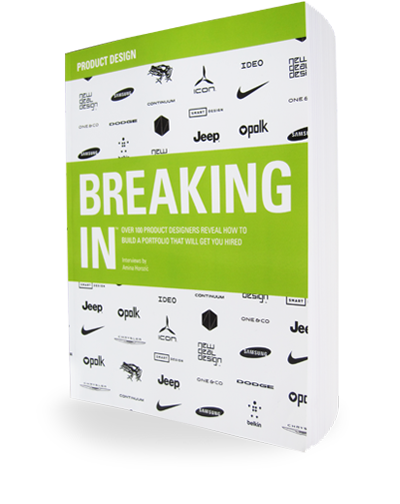Check out some great work from Brian Ling.
What kinds of portfolios get your attention these days? What brings in an industrial designer for an interview?
It depends on the position level of the designer applying for the job. At the junior to mid-level, I would expect to see portfolios that show a lot of the designer’s thinking process. You really don’t have a lot of time to get to know a candidate as most interviews last an hour, so you can’t really tell if they are completely up to par. However I’ve found that designers who can articulate their thinking process make good hires. I’ve found that the thinking is the most important characteristic.
[ … ]
Have you seen a portfolio recently that resonated with you, and what about it stood out?
Yes. He was a fresh graduate, but exhibited a level of maturity that was impressive. All his projects were presented in a way that showed how he came up with the idea and developed it into a design solution. The interesting thing about it was that he turned it into a story. Instead of the usual A leads to B to C and then to D, he presented the work through scenarios by using simple illustrations that were very clear and easy to understand.
What do you think of showing work that’s not industrial design in a portfolio? Things like art, photography, hobbies, etc.?
It would be interesting to see what else a designer is passionate about. However, it does not add to the discussion as my concern when I hire a designer is: can he deliver the goods on time and to the quality required?
What do you expect to learn from the designer during an interview?
The ability to think critically about a problem and how they go about solving it, the sort of technical skills (sketching, 3D CAD, presentation, etc.) they have, and how comfortable they are with them. Will they be a good fit for the team? I have rejected good designers who don’t complement the team as, for example, there may be too many people with similar skills. Soft skills and hygiene factors like eye contact, ability to take criticism, and communication skills. I have on occasion asked candidates out for a chat over coffee so that they will be in a less formal environment.
[ … ]
What characteristics or qualities are necessary to be a successful industrial designer?
As mentioned in the previous question, the ability to think critically about a problem. This is much less common than you would expect. Creativity and the ability to create strong design solutions. To a certain extent, being a designer still boils down to being creative. The ability to empathize with consumers they are designing for and being able to relate with people in the team from other disciplines. A good work ethic, no point being super creative, but lazy. A resourceful problem solver.
You’ve mentioned “the ability to think” as a key skill for a product designer several times now, and with good reason. This may sound like an odd question, but how would an industrial designer demonstrate this skill in their portfolio or during an interview?
I would say that this is a combination of a designer having a habit of questioning everything—in the context of the design problem—showing evidence of deep problem analysis and signs of pushing oneself to the edge and beyond.
[ … ]
Anything we didn’t cover that you would like to add? Any final words of wisdom?
If you see where ID is heading, you can see that design is a very multidisciplinary activity. While designers don’t need to learn to wear many hats, they will need to learn to empathize with the different people they work with by having the ability to speak their language. This is so they may apply their skills in an effective manner.

Brian Ling of Design Sojourn

Comments are closed.